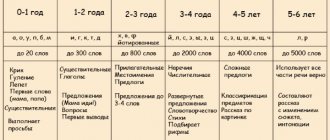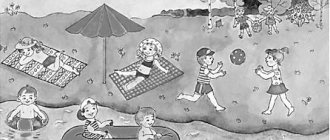Organization and holding of speech festivals and entertainment in preschool educational institutions
Category: Golubeva O.V. Published: 19.02.: 3411
Speech holidays and entertainment are one of the current types of work for both preschool speech therapy and mass groups. It is known that game tasks help to cultivate interest in the environment and stimulate the cognitive activity of preschoolers. By promoting the development of mental and speech activity, the game relieves stress that usually arises during classes.
In correctional work with children with special needs development, the formation of the sound, lexical and grammatical aspects of the language is the ultimate goal, which requires long-term painstaking work of a speech therapist, educators and parents.
The development of speech in children with special needs is one of the most important tasks of correctional and educational work in preschool educational institutions. Speech deficiencies in this category of children are manifested in poor vocabulary, incorrect phrase construction, underdevelopment of coherent speech, and phonemic hearing. However, the most important place in the overall picture of speech underdevelopment of such children is occupied by the immaturity of verbal communication. The communicative function of speech is genetically earlier, and it is this that serves as the basis for the formation of other speech functions. Knowing these features, it is necessary to plan speech development classes in such a way as to provide optimal conditions for the formation of children’s need for communication. The teacher should encourage any attempts by children to ask or tell an adult about something; during regime moments, constantly encourage the children to seek help, advice from an adult, a friend (“Ask Alyosha to help you,” “Tell the guys about what you saw,” “Say “thank you” ...).
In mathematics, modeling, and drawing classes, you should also pay attention to the activation of verbal communication and children’s ability to listen; put the guys in conditions that encourage them to say something, ask something, tell each other. It is also necessary to ensure that such communication is effective, that is, after it the game begins, the necessary assistance is provided, etc.
The teacher must constantly pay attention to the intonation expressiveness of speech, teach children to make requests (“Sveta, ask me what I’m doing.” Say: “Olga Alekseevna, what are you doing?”).
In art classes, children should be taught to analyze their work, and after a while - to compose a short story based on the drawing.
The next stage in the development of speech activity is a conversation - a dialogue between several interlocutors, in which the leading role belongs to the teacher. He comes up with questions, models answers, and encourages children to actively participate in dialogue, especially in asking questions.
The higher the independence and speech activity of the child, the higher the level of development of dialogic speech and the possibility of high-quality development of monologue speech. Conducting a full conversation and free dialogue is possible only at the end of the second – beginning of the third year of study. The formation of dialogical speech is the basis for mastering coherent speech and the ability to compose stories.
Children with ODD almost always suffer from mental processes and cognitive activity. They are characterized by poor memory, fatigue, and inability to concentrate.
You can attract the unstable attention of preschoolers to classes only by getting them interested, that is, by making learning entertaining. The leading type of child activity is play, which significantly changes the motives of behavior and opens up new opportunities for the development of cognitive activity. And that means for the formation of voluntary attention - selective focus on a specific object or phenomenon of the surrounding world. The process of forming voluntary attention should occur daily in the form of a game. Having assessed the level of mental development of children in this group, the teacher should draw up a list of games that arouse the greatest interest in them and make it possible to successfully carry out correctional work.
As an example, I will give a list of competitive games for the formation of coherent speech, literacy skills, and voluntary attention.
Competitive games
Game "Who can assemble the whole from the parts faster"
Children collect pictures cut into 6-7 parts. (You can divide the guys into two teams.)
Game "Who can name more..."
The teacher names the topic, for example, “Names of girls” (“Names of trees”, “Names of vegetables”, “Tender words”...). Children say names one by one. (You can divide the guys into two teams). For each correct answer, the player receives a chip. The one with the most chips at the end of the game wins.
Game “Who can pronounce the phrase more expressively”
Children take turns pronouncing one phrase at a time; listen to who did it better. The child who pronounces the sentence most clearly wins.
Game "Who Catch More Fishes"
Children are divided into two teams. The guys have fishing rods with magnet hooks. The pictures with sounds also have magnets attached. The child must “catch” the picture fish for a certain sound.
Games for the formation of coherent speech
Game "Magic Chair"
The child (if desired) is seated on an unusual chair, and all the children say pleasant, kind, affectionate words to him.
Ira "Readers' Competition"
The child should read the poem expressively (sadly, joyfully, as a request, as a question...).
Game “Describe a friend”
The child must talk about his friend (his character, habits), taking into account his characteristic features.
Game "Black Box"
Children constantly determine what is in the box by asking questions about certain properties of objects: “Is this a toy? Is it wooden? Is it plastic? Can she be rolled? And so on".
Game "Pass Kindness"
Children stand in a circle. Each child should, when throwing a ball to a neighbor, say 2-3 kind words to him or make up a sentence.
Game "Continue the sentence"
Children must continue the thought started by the teacher: “I’m learning to read books, because...”, “Words must be spoken loudly, because...”, “If I were a wizard, I would...”.
Game “Tell about your mother (about yourself)”
The child should tell about his mother (or about himself): character, habits, favorite things to do, how he spends his free time, what fairy tales he likes to read (listen to), what they affectionately call him at home, and so on.
Game “My Dad is an Artist”
The child must compose a story (fairy tale) based on the drawing (picture, illustration, photograph) that dad drew.
Game “Proverbs, sayings, tongue twisters”
The child must pronounce it expressively, clearly, loudly; explain the meaning of the said proverb.
Games to develop phonemic awareness
Game “Locate the place of the sound in the word”
The teacher pronounces simple words. The child must determine by ear which sound is at the end, at the beginning, or in the middle of the word.
Game "Toy Store"
Children go to the “store”, buy the desired toy, identifying the first or last sounds in its name and give the “seller” the corresponding letter - “money”.
Game “You are the conductor”
The child must divide the word into syllables using hand waves.
Game “TV sound doesn’t work”
Children stand in a circle. The child must whisper the word. The next child passes it further in the circle.
Game “What does a letter look like”
Silhouettes of several letters are depicted on a sheet of paper. The child must determine what each letter looks like (it is advisable to name several objects similar to it).
Game “Place the animals in houses”
The child must determine the place of the sound in the word or determine the first sound and place the animal in the appropriate house.
Game "Who is bigger?"
The game is a competition: who can name the most words with a given sound. Children receive chips for correct answers.
Game “Which carriage do the animals travel in?”
The child must determine the first sound in the names of animals, and then divide the words - names into syllables. (“The cat will go in the first carriage, the fox in the second, the dog in the third”).
Game "Roll Call"
Children stand in a row. The teacher calls the sound. Those guys whose names contain the named sound come forward.
Game "Words Mixed Up"
The teacher pronounces a deformed sentence. Children must change the words in the sentence and pronounce it correctly.
Game "Live Letters"
Each child has a card with a letter. Children must arrange the letters so that they form the word named by the teacher.
Game "Read with the key"
The child has a table with a set of letters. According to the key diagram, he must draw a line along the letters so that the word named by the teacher is formed.
Game "Working with a punched card"
Children must match the words to the pictures, indicate vowel and consonant sounds, and divide the words into syllables.
Game "Rebuses"
Development of sound analysis, attention, logical thinking.
Game "Crosswords"
Formation of sound analysis, development of thinking.
Children who are passionate about play. The ability for involuntary attention increases, observation becomes sharper, and these are necessary qualities for preparing for school. Following the rules of the game requires endurance, self-control, and discipline.
In didactic games and exercises, there must be an exciting task, the solution of which requires mental effort and overcoming some difficulties. The words of A.S. are very appropriate here. Makarenko: “A game without effort, a game without active activity is always a bad game.” By activating thinking, the game affects children's emotions. The child experiences joy from successfully found solutions and quickly and correctly completed tasks. Many games help to replenish and activate the vocabulary. Formation of correct sound pronunciation, coherent speech, and the ability to correctly express one’s thoughts.
As you accumulate the studied material, you can consolidate it in an unusual form - in the form of entertainment. The structure of entertainment is developed taking into account the children’s knowledge, alternating games, tasks, and musical breaks so that the children do not lose interest.
A speech festival is a celebration that unites children by common experiences and emotionality. Everyone is preparing for the speech festival: children, parents, teachers. The hall or group is decorated, children come dressed up, guests are invited. The material in the script is in the nature of developmental educational training. The emotional perception of the material is enhanced by surprise moments. The presence of fairy-tale characters at the holiday arouses great interest among children and enhances the entertainment and theatricality of the holiday.
Each holiday script has a theme, a plot, suggesting roles for children and adults. Parents should also be involved in the games so that they are not passive spectators. Every child is happy if his mother becomes a participant in the game, worries about her, and is proud.
The beginning of the holiday is the beginning. For example, the fun begins with reading a telegram from the Raya doll. Next comes the main development of the action (children perform various tasks, read poems, pronounce proverbs) and the ending - the finale of the holiday (children receive gifts or treats).
Along with consolidating material on teaching literacy, developing phonemic awareness, and coherent speech, it is good to use games for entertainment that improve dialogic speech and expressive speech; developing attention, hearing, touch, memory. Such games require children to have concentrated attention and active activity of their analyzers; ability to distinguish, compare, generalize.
The educational value of speech festivals and entertainment is very great. They promote the development of activity, independence, and self-confidence. At such moments, as a rule, the obstacles that prevent the child from expressing himself actively in the team disappear; uncertainty and indecision disappear. The child easily, without coercion, achieves his goal, acts together with his friends, and persistently achieves the best result.
Fulfilling the conditions of the game and adhering to the rules require the child's concentrated attention, observation, memorization and reproduction. This brings the game closer to learning. Games cultivate honesty, endurance, patience, determination - traits that shape willpower and character.
The content and variety of plots of speech holidays indicate the breadth of knowledge, skills and abilities of children; degree of formation of cognitive processes. For example, in literacy classes, children work on individual assignments. First they write, then they mark the vowels and at the end they check themselves and their friend. Children really like self-esteem: they find mistakes, highlight them and give the appropriate rating: a smiling or sad person (signet).
Children love puzzles and crosswords, which help them learn sound analysis in a playful way.
At a speech festival, children are active and behave freely, so adults need a lot of skill and imagination to hold the attention and interest of the entire group for 30-40 minutes.
Children are active, they cannot work with concentration for a long time, therefore, you need to give them the opportunity to relax and unwind. Physical education minutes are perfect for this. The teacher reads a poem, and the children perform movements corresponding to the text. The teacher must also take into account the fact that children with speech pathology are characterized by increased fatigue; When working with them, you need to often change types of activities and diversify tasks.
Speech holidays are a good way to consolidate and apply acquired knowledge and skills and self-affirmation for children. What's a holiday without gifts? Everyone loves gifts, so for a speech celebration you need to come up with gifts that, if possible, are related to its theme. These could be medals - prizes, stars, cookies in the shape of letters, a pie. But it should be understood that a reward, a prize for performing actions, should act as a motivating factor for more interesting and accurate activities, and not be the decisive moment because of which children complete these tasks.
Teacher-speech therapist Olga Viktorovna Golubeva MADOU "Kindergarten" Pes village
Director's welcome speech
Particularly noteworthy are the corporate speeches of the heads of various enterprises and firms in front of their teams. Directors, as a rule, take the welcoming speech at all kinds of celebrations, summing up the results of the year, honoring veterans, and rewarding leaders.
Here is an example of one of these leader speeches:
“My dear colleagues! I'm glad to see you at the company's anniversary celebration!
You are her main wealth and decoration! Dedicated employees, responsible suppliers and reliable partners. You helped the company move forward and stay on course. You were not afraid of the temporary difficulties that we managed to overcome together.
Thanks to all of you, today the company is the undisputed leader in its industry. We have achieved excellent results and are not going to stop there!
We deserve this holiday! I wish you a pleasant evening in good company of friends. I hope that you will enjoy the event, give you a great mood and leave pleasant memories. And invited artists will help create a festive atmosphere.
Thank you for your attention!"
As can be seen from the text, the same principles apply here as in other speeches. If the manager adheres to them, then this contributes to team unity and works for the corporate culture. If the atmosphere in the company is friendly, the directors are valued and respected, this directly affects the results of work, qualitative and quantitative indicators.
Ability to convey information correctly
Any performance requires at least a little preparation. The audience or hall must be known and inspected in advance. This is necessary in order to understand whether the one who will speak will be visible and audible from all places.
Maintaining eye contact with the audience throughout the entire time certainly includes a high-quality welcoming speech, an example of which all lecturers should take note of.
Before the performance, you should practice, check the microphone, the sound of your voice, so that there is no interference later.







